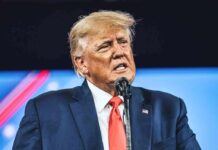Luigi Mangione, accused of murdering UnitedHealthcare CEO Brian Thompson, faces mounting legal challenges as his defense team fights to suppress evidence and reframe his writings, amid debates over how a highly educated Ivy League graduate allegedly turned to violence.
Quick Takes
- Mangione faces murder charges in New York and potential federal death penalty for the shooting of UnitedHealthcare CEO Brian Thompson
- Defense attorney argues police unlawfully detained and searched Mangione at a Pennsylvania McDonald’s, seeking to suppress critical evidence
- Lawyers object to prosecution’s labeling of Mangione’s writings as a “manifesto,” claiming it prejudices potential jurors
- Despite an Ivy League education from the University of Pennsylvania, Mangione allegedly targeted Thompson to send a message about healthcare industry grievances
- Defense strategies may include jury nullification, insanity plea, or challenging evidence collection methods
A High-Profile Murder Case Emerges
Luigi Mangione stands accused of murdering Brian Thompson, CEO of UnitedHealthcare, in New York City last December as Thompson was entering an investor conference. The case has drawn national attention both for its high-profile victim and the alleged motivations behind the killing. Prosecutors claim Mangione meticulously planned the murder, using a 3D-printed ghost gun to shoot Thompson before fleeing the scene on a bicycle. He now faces six charges in New York, including murder in furtherance of terrorism, plus federal murder charges that could result in the death penalty if convicted.
The magnitude of evidence against Mangione appears substantial, with investigators reportedly finding matching shell casings and fingerprints connecting him to the crime. Additional charges in Pennsylvania involve a 3D-printed firearm and fake ID discovered at the time of his arrest. Despite the seemingly overwhelming physical evidence, Mangione has pleaded not guilty to all charges, setting the stage for what promises to be a complex legal battle with significant media coverage.
Defense Strategy Takes Shape
Mangione’s defense team is vigorously contesting the legality of evidence collection following his arrest at a McDonald’s in Altoona, Pennsylvania. His attorney argues that police unlawfully detained and searched Mangione, potentially violating his constitutional rights. This strategy aims to suppress key evidence including writings, statements, and DNA evidence that prosecutors consider crucial to their case. Legal experts suggest that successfully challenging the admissibility of this evidence could significantly weaken the prosecution’s position.
“The use of this characterization of the defendant’s alleged personal experiences and writings is incorrect, improper and without justification and has no probative value,” Dickey wrote in a court filing on the matter.
Another significant aspect of the defense strategy involves challenging the prosecution’s characterization of Mangione’s writings as a “manifesto.” Defense attorney Thomas Dickey has forcefully argued that this terminology prejudices potential jurors by implying extremist motivations. This linguistic battle reflects broader efforts to control the narrative around Mangione’s alleged grievances against the healthcare industry, which prosecutors claim motivated the killing. Legal observers note that such terminology can significantly influence public perception before trial.
The Puzzling Profile of an Alleged Killer
The case has generated particular interest due to Mangione’s educational background and apparent success. A University of Pennsylvania graduate with degrees in computer science, Mangione was once valedictorian at the prestigious Gilman School in Baltimore. This disconnect between his elite education and the violent crime he’s accused of committing has fueled speculation about his motivations and mental state. Prosecutors allege he targeted Thompson specifically to spark public discussion about the healthcare industry’s practices.
Legal experts have identified several potential defense strategies as the case moves forward. Jury nullification might be pursued by appealing to public frustration with the health insurance industry. An insanity defense could potentially protect Mangione from the death penalty but would require extensive investigation into his mental health history and psychological state at the time of the alleged crime. With surveillance footage showing Mangione at a Manhattan hostel gaining viral attention, the case continues to generate significant public interest and debate about healthcare grievances and violence.
Sources:
- https://brianzeiger.com/blog/evaluating-legal-defenses-in-the-luigi-mangione-case/
- https://news.yahoo.com/luigi-mangione-journal-not-manifesto-144315900.html
- https://www.foxnews.com/us/luigi-mangione-journal-not-manifesto-about-healthcare-industry-grievances-attorney-argues











